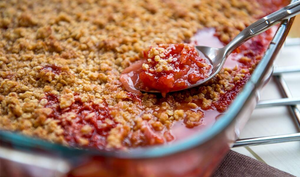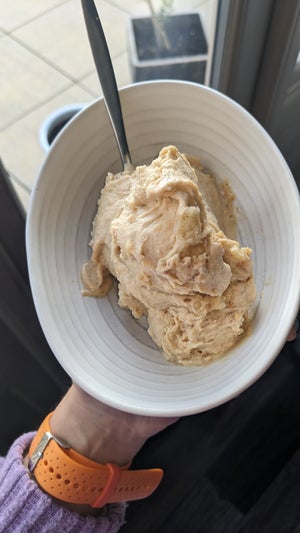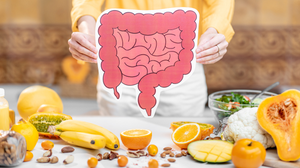In recognition of World Digestive Day coming up this month, we’ve put together five helpful tips to help you stay on top of your gut health.
What is World Digestive Day?
World Digestive Day, which happens on the 29th of May each year, was established by the World Gastroenterology Organisation in 2004, to celebrate the anniversary of the organisation’s foundation in 1935, and to raise global awareness about gut health.
Why is raising awareness of the gut so important?
More and more research is emerging every day about the role our gut has to play in our overall health. From our mental well-being[1], to our immunity[2], to our sleep[3] – our gut health contributes to how we feel and how we function in a multitude of ways, so it’s vital that we nurture it.
Tip one: eat the right foods
Perhaps the most intuitive way to take care of your gut is to make sure that the food you’re exposing it to is nourishing and healthy. But what does a healthy diet really look like? With tens of thousands of flash diets making the rounds in magazines, online, and even in the news – sometimes it’s hard to know where to begin, and exactly what information you can trust.
The most important thing you can learn to make sure your gut health is being nourished by the foods you eat is to understand the what, how, why, where – and even who – of your digestive system. That way, you’ll be better equipped to make healthy diet choices that work for you. So, here we have it: our list of things we think you should know to better look after your gut and digestive system:
Who does a healthy diet benefit?
The who is maybe the most central part of your digestive health. And we don’t just mean you; there’s another major player everyone should keep in mind when making choices about a healthy diet. Or maybe we should say players – plural. What are we on about, exactly? Well, you might know that you – and the human cells that make you, you – are actually not alone within your body. In fact, all of us are sharing our bodies with trillions of living organisms.[4]Our gut, in particular, is full of non-human bacteria, of both the good and the bad kind. The good bacteria, called probiotics, ‘eat’ the food you ingest, and help your gut and body to function healthily.[5] So, when you’re thinking about your diet – you’ll want to keep in mind what your gut microbiota needs, too.
Where does your gut end and begin?
Digestion begins in the mouth, where bacteria and enzymes help to break down food while you chew it.[6] Your mouth has a unique set of flora, just like your stomach, and both are considered part of the gut microbiome. The gut also includes the throat, the intestines – big and small – and the colon.
Each part of your food’s journey is important, involving different bacteria, which help to extract different nutrients from our food. When we talk about the gut, we’re talking about the whole journey, and all of its stopover points.
What your digestive system needs to function
Our gut microbiota depend on a number of different nutrients to create energy and thrive. So, how can we support a healthy gut microbiome? One way is to consume probiotics – the live microorganisms that normally exist in your gut.
Probiotics can be found in high numbers in high-quality probiotic supplements, such as Alflorex®; and they are found in many of the things we eat, including yoghurt, kimchi, and other fermented foods.
A diet rich in fibre is vital for taking care of your gut health. Fibre is food for gut bacteria, helping it to produce energy to perform all the tasks it needs to perform to keep your gut and body in tip-top shape. Plus, research has linked fibre to better gut microbiome diversity, which has many positive impacts on our health.[7]Prebiotic foods are arguably just as important as probiotics. These are the foods which contain lots of fibre – an important nutrient that your probiotics use to survive. Onions, artichokes, legumes, asparagus, artichokes, greens, soybeans, garlic, bananas, and whole grains are high prebiotic foods.
Why gut health is important
Our gut health is important for our digestive health, but the gut also regulates many other aspects of our life. From our immunity, to our mental wellness, to our sleep – the good bacteria in our gut can help to keep us feeling as good as we can be.
The health of our gut microbiome is also a lot about balance. An imbalance of bacteria in the gut, called dysbiosis, has been linked to chronic fatigue, acne, and allergies.[8]
How our gut health impacts our overall health
The role our gut has to play in our overall health is evident – but due to the huge array of bacteria in our microbiome, along with their range of different roles to play, and the connections the gut has to all different parts of our body, we are only just beginning to understand how it all works.
We know our gut health has implications for our mental wellness, and vice versa, because of the complex network of nerves, chemicals, and hormones connecting the gut to the brain. This connection is called the gut-brain axis.[9] Similarly, our gut bacteria may even help us with sleep by creating chemical messengers such as serotonin and dopamine.[10]
When is it most important to take care of your gut?
Our gut microbiome begins developing from birth, and changes throughout our lifetime. These changes can be both good and bad for us.
We also may experience more negative digestive symptoms when we are under stress; or for women, at certain points in the menstrual cycle. It’s important to take extra care of our gut health during these times.
Our gut health may even play a role in whether we are likely to suffer from certain illnesses – particularly those that are more common later in life. For example, patients with certain kinds of cancer often show differences in their gut microbiota in comparison to healthy individuals.[11]
The implications of our gut health on our overall health throughout our lifetime are numerous – and we are learning more about this relationship every day. That’s why we should be taking care of our gut health not just on World Digestive Day, but every day, to ensure we are as healthy as we can be.
Tip two: take time to rest
Just as diet is important for our gut and digestive health, other lifestyle factors are too. Relaxation, self-care, sleep, and meditation are all forms of rest that are important to find time for in our everyday lives. Skipping these things might feel like it saves you time in the short term, but the long-term impacts both stress and a lack of sleep can have on our health can end up costing us in very major ways and holding us back.
Studies have linked gut microbiome diversity with sleep quality.[12] People who are stressed tend to sleep less, and this lack of sleep contributes to further stress.[13] So, make sure you’re getting the rest you need to avoid falling into a negative cycle.
Tip three: regular exercise really does make a difference
Getting enough exercise has been linked to better gut health – people who exercise have been found to have more beneficial bacteria making up their microbiome.[14] So, don your running shoes and take a jog around the block this World Digestive Day, or do some celebratory jumping jacks!
Tip four: try to avoid stress
Did you know that stress can negatively impact the composition of your gut microbiome – increasing the number of bad bacteria and suppressing the number of good bacteria living in your gut?[15] If you’re feeling pressure from work, study, relationships, or otherwise – try some stress management techniques, like meditating or journaling.
Tip five: take a probiotic supplement
When life gets in the way, sometimes it’s hard to eat a balanced diet rich in probiotics and prebiotics, while also getting enough rest and exercise, and avoiding stress. That’s where taking a probiotic supplement can help. Alflorex® supplements are scientifically studied, and provide daily support for your gut health. What’s more, they’re lactose and gluten free, so whatever your dietary requirements, taking them is an easy way to support your gut health every day.
Read More on Gut Health

How Gut Care Could Improve Your Skin
Learn how gut health and skin health are connected and how a healthy gut can lead to health skin.

Beneficial Bacteria: Why good bacteria matters to your gut health
Do you know what good bacteria is and why good gut bacteria is important for our overall health? Learn more here.
Sources
https://www.ncbi.nlm.nih.gov/pmc/articles/PMC6779243/[1]https://www.health.harvard.edu/diseases-and-conditions/the-gut-brain-connection
[2]https://www.uclahealth.org/news/want-to-boost-immunity-look-to-the-gut#:~:text=Immune%20cells%20in%20the%20gut,in%20turn%20affect%20immune%20cells.
[3]https://www.medicalnewstoday.com/articles/how-gut-microbes-contribute-to-good-sleep
[4]https://www.sciencefocus.com/the-human-body/human-microbiome/
[5]https://www.ncbi.nlm.nih.gov/pmc/articles/PMC4566439/#:~:text=In%20a%20healthy%20state%2C%20the,modulation%20of%20the%20immune%20system.
[6]https://www.drstevenlin.com/how-your-gut-microbiome-link-to-a-healthy-mouth/#:~:text=The%20mouth%20is%20a%20part,can%20affect%20your%20oral%20health.
[7]https://www.bmj.com/content/361/bmj.k2179
[8]https://www.health.harvard.edu/blog/leaky-gut-what-is-it-and-what-does-it-mean-for-you-2017092212451
[9]https://www.ncbi.nlm.nih.gov/pmc/articles/PMC4367209/#:~:text=The%20gut%2Dbrain%20axis%20(GBA,microbiota%20in%20influencing%20these%20interactions.
[10]https://www.medicalnewstoday.com/articles/how-gut-microbes-contribute-to-good-sleep
[11]https://kresserinstitute.com/gut-hormone-connection-gut-microbes-influence-estrogen-levels/
[12]https://www.ncbi.nlm.nih.gov/pmc/articles/PMC6779243/
[13] https://www.apa.org/news/press/releases/stress/2013/sleep#:~:text=Adults%20who%20sleep%20fewer%20than,6.2%20hours).
[14]https://atlasbiomed.com/blog/how-does-exercise-affect-gut-microbiome/
[15]https://www.healthline.com/health/digestive-health/3-day-gut-reset#day-3








